ENVIRONMENT, ENERGY & POLITICS
Karpowership game ranch ‘donation’ raises new stink over green offset schemes
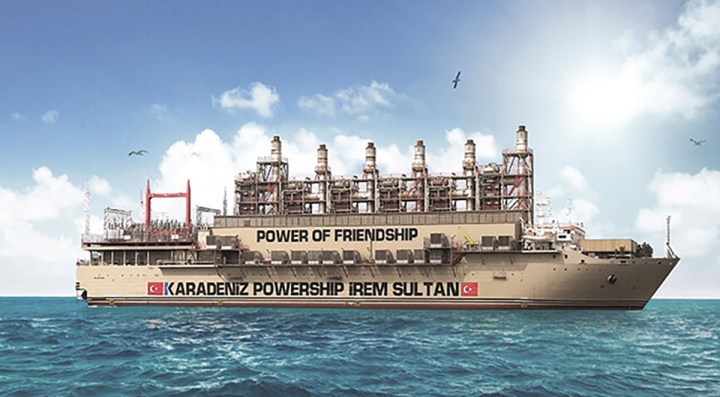
KwaZulu-Natal’s official custodian of nature conservation has stepped into a pungent quagmire after entering into a provisional agreement that involves the ‘donation’ of a 1,784 hectare hunting ranch – ostensibly to counterbalance the negative impacts of Karpowership operations on the marine environment of Richards Bay harbour.
This story has been updated post-publication to include a statement by Ezemvelo below
Ehhh, come again… How could the acquisition of Madaka Game Ranch (a high-altitude land parcel some 130km from the closest shoreline of the Indian Ocean) possibly ameliorate negative ecological impacts on a crucial nursery area for sea fish or migratory water birds? Has Ezemvelo KZN Wildlife been “bought off” to look the other way?
Rightly or wrongly, these are some of the damaging perceptions that have caught hold and raised concern among several conservation interest groups and members of the public after Ezemvelo entered into biodiversity offset negotiations with the Istanbul-based floating power ships group.
Offset agreements are relatively new mechanisms used across the world to make up for the damage of development projects on the environment, usually by safeguarding or restoring another area with the same or similar ecological features to the area negatively affected by development.
Ezemvelo’s own offset guidelines do make provision for “out-of-kind” agreements or for financial compensation, but only in “exceptional cases”, where it is not feasible to find similar alternative habitat.
Daily Maverick invited Ezemvelo to comment on these issues on 6 September, but the conservation agency has yet to respond officially, other than to state that Madaka Game Ranch has not been transferred to it yet, and that any final agreements are subject to approval by the national Department of Forestry, Fisheries and the Environment (DFFE).
Nevertheless, in a letter sent to the DFFE on 22 August, the conservation agency confirms (three times) that it will not object to Karpowership being granted environmental authorisation for the Richards Bay power ships if the proposed offset deal is approved by the national department.
If the deal was approved, Madaka would be purchased by Karpowership and donated to Ezemvelo to expand the neighbouring Ithala Game Reserve near Vryheid. This would expand the size of the 29,653ha Ithala reserve by 6%, thereby enabling Ezemvelo to better conserve rhinos and elephants, along with other plant or freshwater species such as the Barberton Mountain Sugarbush or the Southern Barred Minnow.
A closer reading of Ezemvelo’s letter suggests that any agreements with Karpowership are also strictly conditional upon a separate and specific marine-related biodiversity offset agreement – and a clause providing for High Court arbitration if Karpowership were to renege on the agreements.
But the precise terms of the marine offset agreement remain unclear after proposals to rehabilitate nearby estuaries at Umvoti, iNhlabane or in the uThukela Marine Protected Area were deemed unfeasible in the short term.
Ezemvelo’s letter incorporates some tortuous logic, including a statement that “Ezemvelo is of the opinion that the purchase of Farm Madaka for inclusion into Ithala Game Reserve will make a meaningful contribution to the biodiversity status of KwaZulu-Natal and would ultimately benefit, to some extent, the marine ecosystem through securing the ecological services the property provides.”
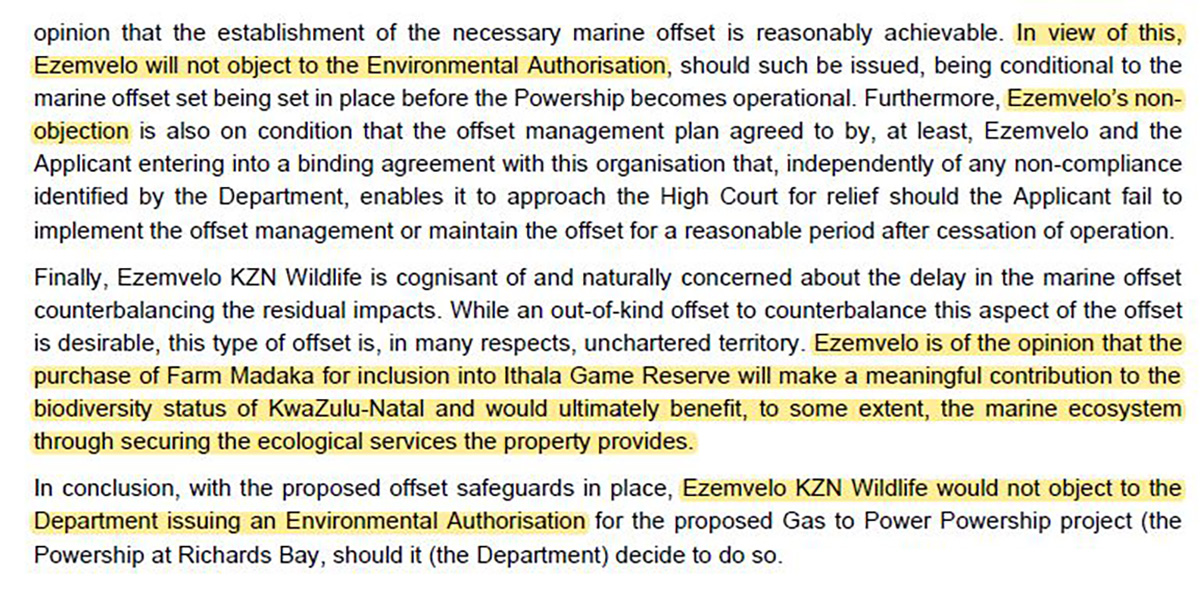
An extract from Ezemvelo letter to DFFE on the Madaka deal. (Image: Supplied)
Not surprisingly, Ezemvelo has come in for strong criticism from several quarters and has also been urged to clarify its position by publishing the full terms of any agreements with Karpowership.
The country’s oldest environmental conservation group, the Wildlife and Environment Society of South Africa (Wessa), said Ezemvelo appeared to have altered its original stance against aspects of the Karpowership proposal.
“The reported Ezemvelo volte-face and subsequent acquiescence is deeply concerning, and the apparent lack of consultation and transparency on the agreement itself creates the perception that Karpowership has ‘bought’ approval for its project,” senior Wessa officials Helena Atkinson and Dr Gary Koekemoer said.q
“Given the already poor reputation engendered by previous Karpowership SA’s environmental authorisation attempts, it is troubling that the company appears intent on manipulating the assessment processes to secure an outcome in its favour.”
While offset agreements had significant potential to restore wildlife habitats or to sequester carbon emissions, “buying a game farm cannot mitigate against the environmental impact” of power ships.
“Unfortunately, as demonstrated by some projects, it also has great potential for unscrupulous companies to ‘greenwash’ their unsustainable developments and practices, thereby undermining both the integrity of the mechanism and threatening its future viability.”
Several concerns raised
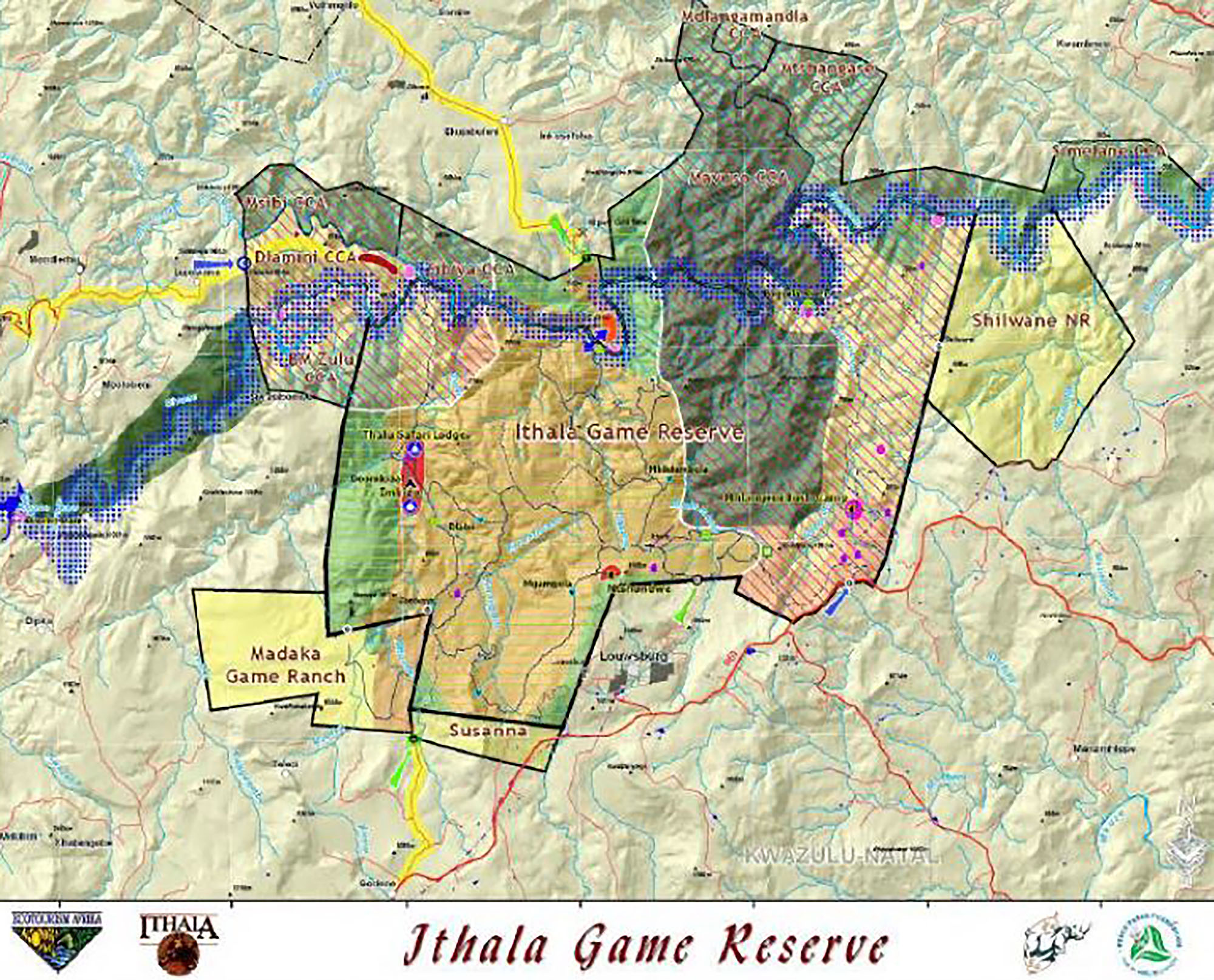
A map showing location of the Madaka Game Farm and Ithala Game Reserve. (Source: EIA report)
Atkinson and Koekemoer said the proposal raised several other concerns about the Madaka project, including whether Ezemvelo had the financial or staff capacity to manage a new conservation area.
“Not having sight of the agreement leaves these questions unanswered and means the public cannot evaluate its biodiversity worth,” they said, adding that the public had also been excluded from the assessment process.
“In a post-Zondo Commission world, South Africans desperately need their faith restored in our systems of governance, and proof that corporates do not simply buy decisions to favour their interests. And in the midst of a global mass extinction of species due to human activity, abandoning an irreplaceable Critical Biodiversity Area simply because that’s the way things are and likely to be, is a failure of both vision and duty by the provincial conservation authority,” they said.
Yet, for its part, Karpowership has presented the Madaka plan as a “landmark” agreement to mitigate its “residual environmental impacts” at Richards Bay.
It was also a demonstration of the company’s “unwavering commitment to the environmental sustainability of its projects” and it regarded offsets as an important tool for conserving biodiversity while allowing for economic activity and socioeconomic upliftment.
“As a demonstration of support for Karpowership SA’s ambitious environmental conservation endeavour, Ezemvelo has indicated that it will not object to the environmental authorisation being issued,” the company said on 6 September.
All the same, other environmental experts who have been watching the Karpowership EIA process closely are worried.
‘Estuarine habitat is irreplaceable’
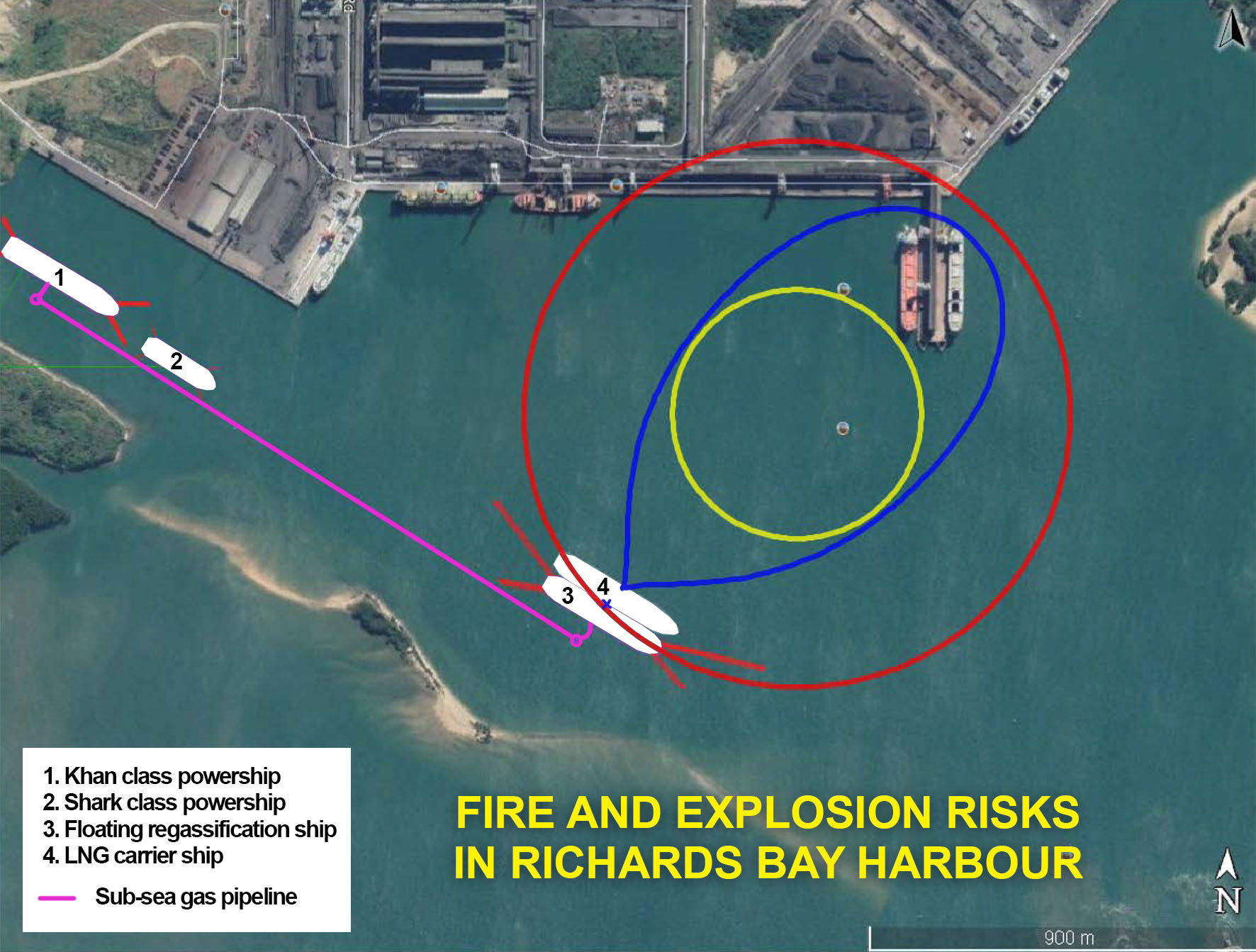
The location of Karpowership vessels in Richards Bay harbour. (Source: EIA report)
Prof Digby Cyrus, a senior estuarine ecologist specialising in fish and birds, said the affected sandspit and marine/estuarine habitat in the Richards Bay /uMhlathuze Estuary were classified as a Critical Biodiversity Area (Level 1) which was considered irreplaceable.
The proposed offset was therefore “unacceptable” for an area that formed a critical nursery ground for juvenile fish and prawns along the KZN coast.
Because the proposal gave no details about specific offsets within the estuarine harbour, “one is then left asking: If the decision is taken not to use the uMhlathuze Estuary, and an equivalent estuarine offset is currently not known to exist, how will the offset option be implemented?
“It would be unacceptable for DFFE to accept an estuarine offset for such an important component of the Richards Bay Estuarine ecosystem without the actual offset, its methods of implementation, rehabilitation and functioning etc, being detailed in the Karpowership application.”
‘It is bizarre, irregular, unlawful, immoral, bad’
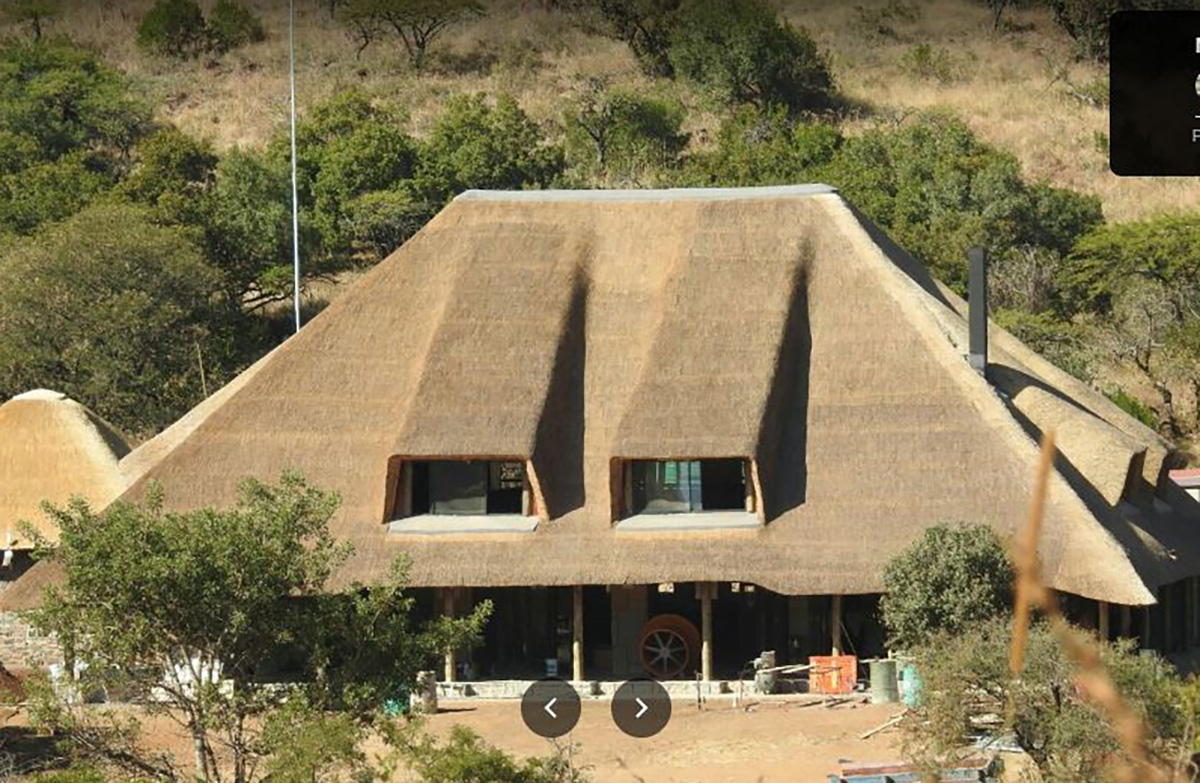
An aerial view of one of the lodges at Madaka Game Farm. (Photo: Google Maps)
Durban environmental lawyer Prof Jeremy Ridl described the proposal as “bizarre”.
“If the ‘offset’ is to buy Ezemvelo’s support for the project (or at least, not to oppose it), it is not only bizarre, but irregular, unlawful, immoral, bad … there are not enough adjectives to describe it.”
Commenting in general terms about the concept, Ridl said: “Offsets anyway, are dangerous. Using the ‘apples and oranges’ analogy, the trade is usually this – a perfect, one-of-a-kind apple for a bag of rotten oranges. It is an illusion to think that the loss of pristine, irreplaceable wetland, grassland or marine life can be compensated for (usually) with degraded land that is to be rehabilitated.
“It is not a fair trade. Rewilding and rehabilitation of degraded land should happen anyway. It should not be rewarded by allowing the destruction of something precious and irreplaceable.”
In a journal article published in 2021, environmental researcher Dr Jenny Pope and fellow academics at North West University note that offsets are often seen as “conceptually murky” and are typically positioned as the “last resort” when other options have been exhausted.
“Biodiversity offsets are appealing to developers and often also to regulators, since they appear to offer a ‘best of all worlds’ solution to the trade-offs inherent in the vast majority of development approvals in which some level of adverse environmental impact is unavoidable.”
“There are numerous increasingly insistent voices, however, arguing that there are fundamental issues with both the concept and the practice of biodiversity offsets, with grounds for challenge ranging from the ecological, to the practical, to the economic, to the moral and philosophical, all of which are connected to some extent.”
‘Approach trade-offs with extreme caution’
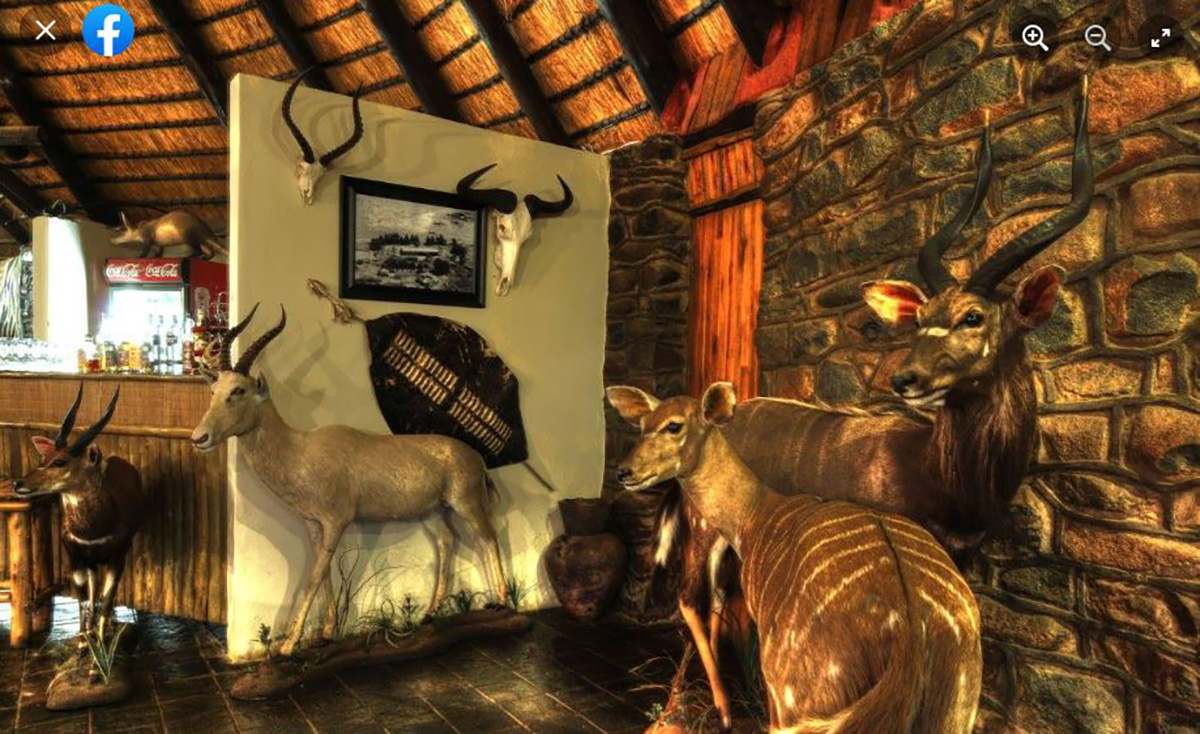
Wildlife trophies at Madaka Game Ranch. (Photo: Madaka Game Ranch / Facebook)
The national biodiversity guidelines published by the DFFE also make the point that: “Biodiversity offsets should be distinguished from trade-offs. A trade-off in the biodiversity context involves exchanging a negative outcome for biodiversity with another positive outcome, which does not necessarily benefit biodiversity, and where it benefits biodiversity, does not properly counterbalance the loss of biodiversity through a like-for-like approach.
“Trade-offs should be approached with extreme caution in the context of environmental authorisation applications given that South African law demands a rational link between impacts on the environment and conditions of environmental authorisations directed at addressing those impacts.” DM
Ezemvelo’s statement on the biodiversity offset principle
The article by Antony Squazzin titled “Karpowership donates game farm in exchange for no objections from KZN wildlife body,” published in Bloomberg News and again in News24 on the 6th of September 2023 bears reference. Mr Squazzin’s claim that Ezemvelo KZN Wildlife (Ezemvelo) has traded its integrity and independence for a game farm is baseless and is rejected by this organisation with contempt.
Ezemvelo is the conservation agency for KwaZulu-Natal. One of its functions is to assess environmental impact assessments (EIAs) for potential impacts on biodiversity, the effectiveness of the proposed mitigation and the appropriateness of biodiversity offsets should they be required.
In the case of the Karpowership’s application to establish a gas-to-power facility within the Richards Bay Harbour, without going into detail, the marine specialist, Dr Barry Clarke of Anchor Environmental appointed by environmental assessment practitioner – Ms Hantie Plomp of Triplo4 KSA – was of the opinion that the facility’s impacts on the marine and avifaunal environment could be reasonably mitigated and offset. Any residual impacts, i.e., those that remain after mitigation, could be offset by rehabilitating nearby marine environments and recreating marine habitats.
Dr Clarke’s recommendation, in essence, is in keeping with the provisions of the National Environmental Management Act of 1998, which regulates the EIA process and the international, national and provincial guidelines on biodiversity offsets. The role played by Ezemvelo in this instance is no different from the many development and land (or sea) transformation applications this organisation receives annually a fact that Mr. Squazzin seems to have overlooked.
According to the Manager: Integrated Environmental Management & Protected Area Planning at Ezemvelo KZN Wildlife, Dr. Andy Blackmore, offsets are to compensate for adverse biodiversity impacts after mitigation has been applied. These are known as ‘residual impacts’. The biodiversity offsetting principles, applied in South Africa and universally, characterise various types of offsets that can be applied to achieve the overriding principle of ‘no net loss of biodiversity’ but preferably a ‘net gain’.
Examples of some offsets include;
– ‘Like for like’ or ‘in kind offsets, where biodiversity losses are compensated with gains for exactly the same biodiversity (species, habitats, biotopes etc.)
– ‘Trading up’ offsets where the offset conserves or protects significantly more threatened biodiversity than that lost (these may be considered, under certain circumstances, to contribute to the country’s conservation objectives), and finally
– ‘Out of kind’ or flexible offsets are when the offset safeguards important biodiversity that is substantially different from that damaged by the development.
Following Dr. Clarke’s findings, recommendations and outcome of his specialist study, Ezemvelo KZN Wildlife advocated to the Department of Forestry, Fisheries, and the Environment In the Karpowership’s application, that Karpowership SA will have to secure an extensive marine (like for like or in kind) offset if their application is to be authorised. ‘Multipliers’, an accepted method for calculating residual negative impacts and offsets, will be built into the offset that considers uncertainties, gaps in information and time lags. Multipliers effectively increase offset requirements to increase confidence in achieving the intended outcomes.
Recognising that the competent authority may deem this application to be in the National interest and that the Karpowership could be operational ahead of the required marine restoration, Ezemvelo suggested to Karpowership that they may wish to consider, as a show of good faith and commitment to biodiversity, and out of kind offset that could be secured immediately that would significantly contribute to KwaZulu-Natal’s protected area network and the conservation of threatened or endangered species, thereby making good on potential lag time impacts. Karpowership agreed in principle to this suggestion. Farm Madaka, adjacent to Ithala Game Reserve, is under consideration for this offset.
Dr Blackmore further stated that “Ezemvelo’s recommendation, while noting potentially significant gaps in the EIA specialist studies, is that Karpowership will have to set two offsets in place. The first is to compensate for the potential residual impacts on the marine environment, and the second is for the potential delay or lag time in the marine offsets becoming functional. Should the environmental authorisation be granted with these conditions, it will be considered pioneering because it considers specifically offsetting lag times.”
Mr Squazzin’s article is incorrect in that:
o There has not been a purchase, let alone a donation of a game farm to Ezemvelo KZN Wildlife.
o Ezemvelo KZN Wildlife introduced an additional biodiversity offset not contemplated in the provincial and national offset guidelines or previously imposed on a developer in South Africa.
o Ezemvelo has traded its integrity and independence for a game farm.
The fact of the matter, Ezemvelo KZN Wildlife has insisted that Karpowership SA go beyond what traditionally is required of developers following the EIA process. Not only will Karpowership SA have to secure the extensive marine and estuarine offset, which Dr Clarke has indicated is reasonably achievable, but they will also have to compensate South Africa’s biodiversity heritage for the lag (even if this does not arise) in the marine offsets becoming fully functional. By requesting this second and additional offset to be in place, Ezemvelo views it as a significant step towards holding developers accountable for their impacts on biodiversity or placing South Africa’s biodiversity heritage at risk.






















 Become an Insider
Become an Insider
Blatant and insincere!